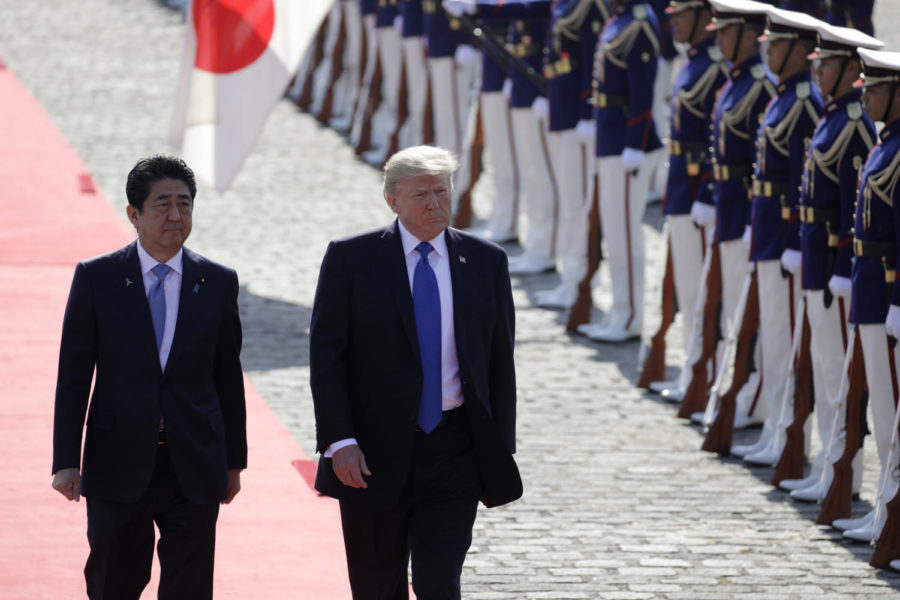Trump touts solidarity with Japan but refuses to shy away from trade
U.S. President Donald Trump, center, and Shinzo Abe, Japan’s prime minister, walk past an honor guard at Akasaka Palace in Tokyo, Japan, on Monday, Nov. 6, 2017. (Kiyoshi Ota/Bloomberg (Kiyoshi Ota/Xinhua/ZUMA Wire/TNS)
November 6, 2017
Hailing ties with Tokyo as the closest ever, U.S. President Donald Trump on Monday emphasized America’s “solidarity” with Japan against “the North Korean menace,” but at the same time made no secret of his dissatisfaction with what he considers an unfair trade relationship with its top Asian ally.
Trump’s comment came as he stood together with Prime Minister Shinzo Abe at a joint news conference designed to showcase what the two leaders touted as an unprecedented level of Japan-U.S. solidarity.
Trump, who was in Japan on the first stop of his five-nation trip to Asia, was scheduled to finish his three-day stay in Tokyo on Tuesday morning when he flies to his next destination, South Korea.
Advertisement
After the summit, two high-ranking Japanese officials called the overall outcome a success, with one noting that Trump had not, as feared, pressed Abe too hard on the trade front.
The prime minister, for his part, said the two leaders “completely agreed” that the allies must continue to take a hard-line approach to nuclear-armed North Korea, a strategy that involves heaping “maximum pressure” on the regime.
As part of this, the Japanese leader revealed that Tokyo will further tighten the screws on Pyongyang by putting a fresh freeze on assets controlled by 35 organizations and individuals in North Korea.
“The United States of America stands in solidarity with the people of Japan against the North Korean menace. History has proven over and over that strong and free nations always prevail over tyrants,” Trump said.
“We stand together to defend the security and sovereignty of both of our countries.”
Reiterating the “era of strategic patience” has come to an end, Trump added: “Some people say that my rhetoric is very strong, but look what’s happened with very weak rhetoric over the last 25 years.”
Both Trump and Abe claimed that Japan-U.S. ties had reached a historic level.
Advertisement*
“At no time in the history of the Japan-U.S. alliance did the leaders of our two nations spend a year building so deep and tight a relationship as we have,” Abe said.
Trump, too, noted the strong bonds.
“There has never been such a close relationship” between the two nations’ leaders.
The U.S. president, however, made it a point to note his dissatisfaction with the trajectory of Washington’s trade ties with Tokyo.
“I’m committed to achieving a fair, free and reciprocal trading relationship,” Trump said. “We seek equal and reliable access for American exports to Japan’s market in order to eliminate our chronic trade imbalances and deficits with Japan.”
Trump has pushed for a more favorable bilateral trade deal with Japan in lieu of the multinational Trans-Pacific Partnership accord, which he pulled out of in January as one of his first priorities as president.
On Monday, as he met with a circle of Japanese business leaders in Tokyo, he stood firm on his anti-TPP stance, saying it was “not the right idea.”
“We will have more trade than anybody ever thought of under TPP, that I can tell you,” he was quoted by the White House as telling the business leaders.
“Ultimately I’ll be proven to be right.”
Abe, for his part, tried to shift his emphasis from bilateral trade to his efforts to create a “fair and effective” economic order in the Asia-Pacific region.
Abe also boasted that the two leaders agreed there was a need to work further to create a “free and open Indo-Pacific region,” a key diplomatic goal upheld by Tokyo as it seeks to promote an international maritime order — a move widely seen as an attempt to counter China’s growing assertiveness. In a moment perhaps typical of Trump’s braggadocio, the U.S. leader also said that Japan should be able to “easily” shoot down missiles fired by North Korea once the nation completes the purchase of a “massive” tranche of military gear from the U.S.
The U.S. president had earlier questioned in a conversation with leaders from Southeast Asian nations why Japan, as a country of “samurai warriors,” didn’t intercept two missiles that flew over the archipelago earlier this year, according to reports.
“One of the things I think really important is that the prime minister of Japan is going to be purchasing a massive amount of military equipment, as he should,” Trump said. “We make the best military equipment by far. … It’s a lot of jobs for us and a lot of safety for Japan.”
Abe responded by confirming that Japan will indeed amplify its defense capabilities by introducing equipment, including F-35A fighter jets, from the U.S. Japan also plans to introduce the U.S. land-based Aegis Ashore system to counter the threat posed by North Korea’s nuclear weapons and ballistic missile programs.
___
(c)2017 the Japan Times (Tokyo)
Visit the Japan Times (Tokyo) at www.japantimes.co.jp/
Distributed by Tribune Content Agency, LLC.
Advertisement








